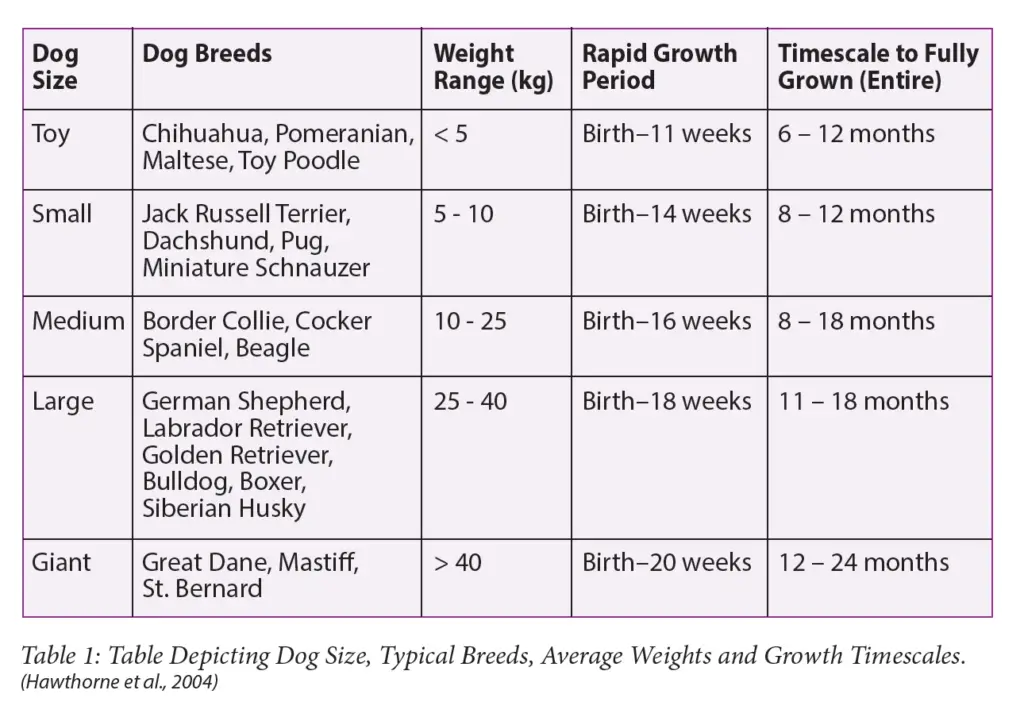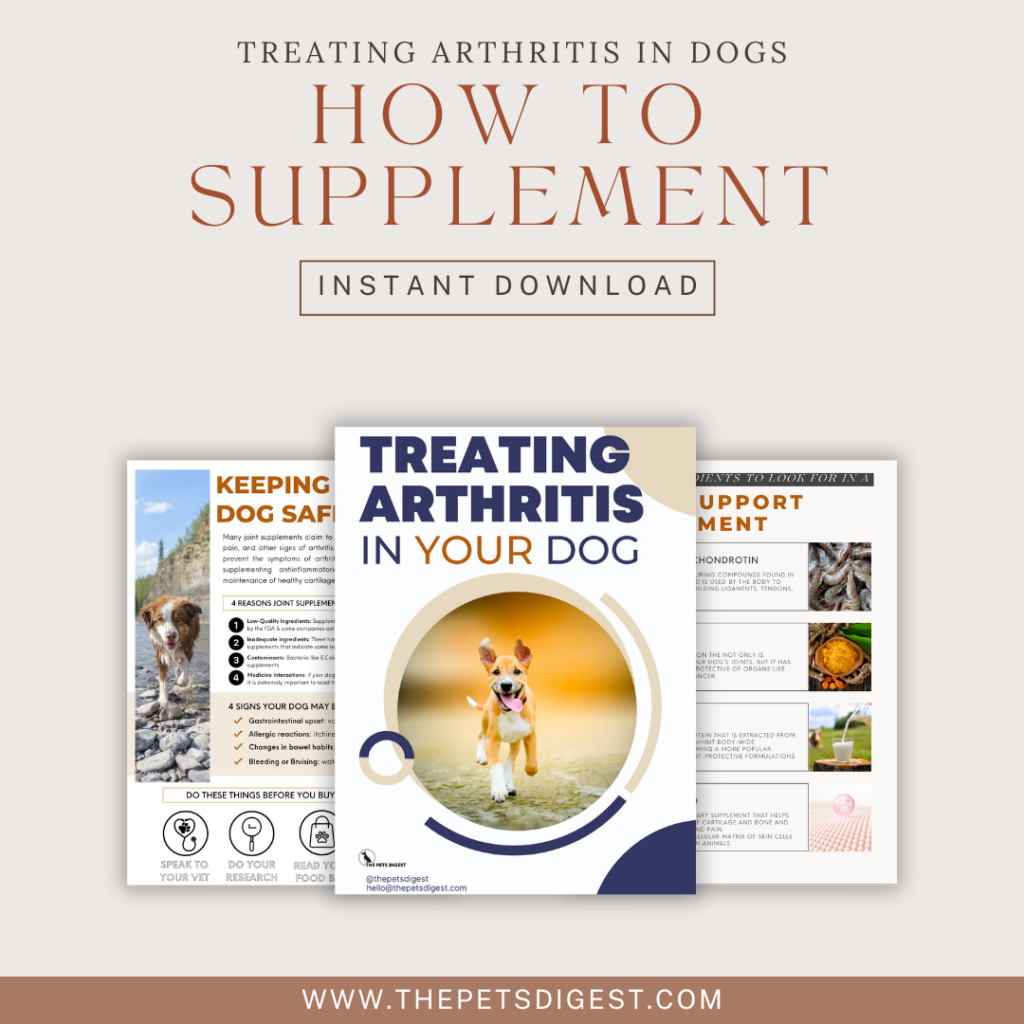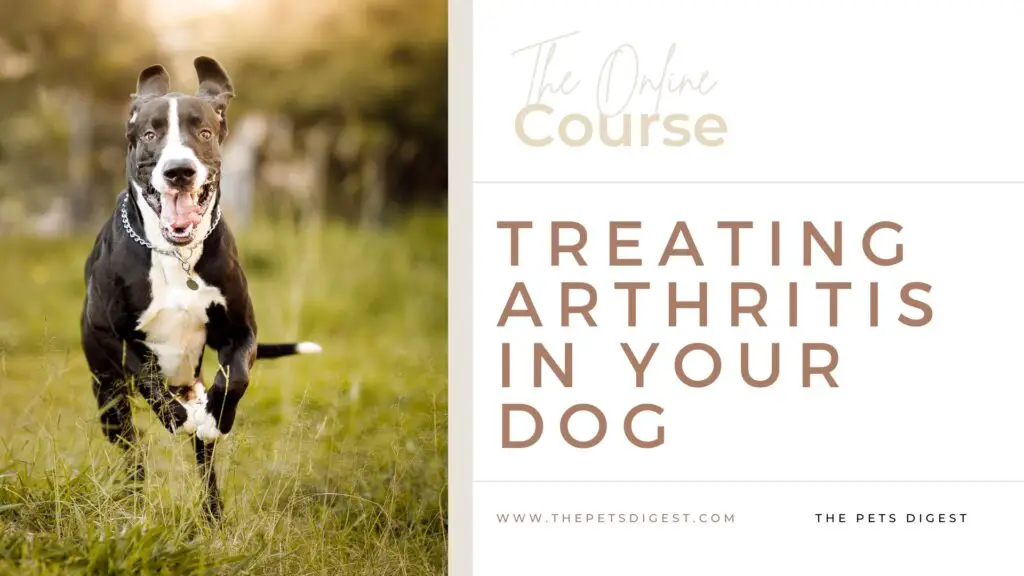Did you know that feeding your large or giant breed puppy is quite different than feeding a small or even medium-sized dog?
What you feed your large breed puppy is crucial for proper growth and skeletal formation.
Any dog can get arthritis or other skeletal issues but large and giant dogs seem to be more prone to acquiring the disease than smaller and most medium-sized dogs.
However, there are times that musculoskeletal problems, like osteoarthritis, can begin in puppies under the age of one and larger puppies are more prone to this occurring.
In fact, it is estimated that about 22% of dogs less than one year of age have musculoskeletal problems, and 1 out of 5 of these issues are due to poor nutrition. (Source)
The most common abnormalities seen are osteochondrosis and hip dysplasia.
There are of course other reasons why dogs may be prone to getting osteoarthritis including age and breed. If you want to learn more about these reasons read these two articles: 12 factors that can contribute to arthritis in dogs and how diet can help and dog breeds predisposed to osteoarthritis and how food can help.
Let’s first define what a large-breed puppy is
What is a large or giant breed puppy?

Large breed puppies are those that will reach more than 70 pounds of body weight as adults. Some examples are Doberman pinschers, German shepherds, and Great Danes.
The time to reach their adult weight varies with dogs but in general, it will take between 12 and 24 months for them to be considered fully grown.
There are several risk factors that have been identified which may increase the chances of your large or giant breed pup developing musculoskeletal problems as a puppy.
The chart below from Hartpury may be helpful in determining how long it will take for your puppy to reach adulthood.

Why do large-breed puppies need specific diets?
Growth rate
Large breed dogs not only grow faster but also take longer to their full-maturity weight. So they grow faster for a longer period of time when compared to their smaller counterparts.
Time to maturity
Because they take longer to reach their maturity rate, their bones are still forming and shifting until they reach adulthood, which should be taken into account when feeding.
Nutritional needs
Large breed puppies will need different nutritional needs than smaller or even some medium-sized pups. We discuss the nutritional needs of large-breed puppies below.
Five things to avoid when feeding your large breed puppy

1. Rapid Growth Rate
The growth rate of your puppy is determined by the food you feed him or her.
In large and giant breed dogs growing too rapidly can cause problems later in life. You should avoid rapid growth in your puppy by not feeding high-energy diets and free feeding.
Puppies don’t have an off button when it comes to eating so have set meal times for your puppy with a measured amount of food for them to consume to prevent overeating.
Growing too rapidly can cause stress on the bones and joints, which makes them weak and subsequently susceptible to skeletal malformations.
2. Improper Nutrient Levels
It is important that your pup have the proper amount of nutrients, as too much or too little can cause issues.
This is especially important when feeding a homemade meal.
Calcium
Ensuring that your large-breed puppy has enough calcium in their diet is a delicate balancing act.
Too much calcium or hypercalcemia can cause major issues in large and giant breeds. They can develop osteochondrosis and other malformities.
Too little calcium can also prove to be detrimental to your puppy
It is also critical that your large or giant breed’s calcium-to-phosphorous ratios are adequate as.The optimal calcium: phosphorus ratio is between 1:1 and 1:3.
Vitamin D
Too little vitamin D can cause issues like osteopenia and fractures.
Protein
While there are conflicting studies about protein in large and giant breed dogs it is widely accepted that they should be given diets that are at least 30% protein.
Either way, you should ensure that the protein your dog ingests is of very high quality. Meaning whole foods from quality sources. This means a mix of animal and plant-based proteins since dogs are omnivores and not carnivores like cats.
Many high-quality diets will not only include meat sources like beef, lamb, and poultry but also plant-based proteins.
If your dog’s diet is too low in protein it can cause issues with their growth and skeletal function. On the flip side, if a large or giant breed puppy gets too much protein in their diet it can also result in abnormalities like hip dysplasia. Hip dysplasia often leads to osteoarthritis later in life
Because your large or giant breed puppy will be growing for a long period of time (sometimes up to 24 months), it is important that they have consistent protein levels in their diet.
Fats
You don’t want your pup to have a diet too high in fat as this can cause an increase in energy and possibly weight. Ideally, they should have a fat content of 10%, this is what many large-breed puppy diets will have in their formulation.

3. Improper weaning
It is important that your puppy has had enough time to feed from their mothers. If you can, avoid premature weaning. Weaning can start anywhere between 6-8 weeks of age, but ideally, 8 weeks is optimal.
4. Caloric Intake
Feeding too much food can cause obesity and under-feeding can cause stunted growth in large and giant breed dogs.
If puppies are fed too much and become obese this can put too much pressure on their joints and result in malformation leading to osteoarthritis later in life. Since large and giant breed dogs are a lot larger, this is even more of an issue for them.
Most foods made for large and giant breeds have an adequate calculated caloric intake. You can also determine your dog’s caloric intake yourself using their RER or resting energy requirements.
5. Over Supplementation
It is not usually advised to give puppies, especially large and giant breed puppies, over-the-counter supplements unless they are not getting adequate nutrition from their diet.
Oversupplementaiton can cause numerous skeletal issues, which is why it is important to feed your dog a well-balanced high-quality diet.
Why use preformulated puppy food
- Large and giant breed puppy foods are formulated to purposely take into account their dietary needs:
- They restrict the fat intake and make it lower than many small and medium breed diets this not only helps restrict energy intake it helps them decrease their chances of unnecessary weight gain
- These diets have very defined nutrient levels consistent with what a giant or large breed dog would need for optimal growth
Can you feed your large breed puppy adult dog food?
You can feed your large breed puppy adult dog food, but it is not recommended as it will do more harm than good.
Most veterinarians agree that you should refrain from feeding your large or giant breed puppy adult dog food as they usually have lower calcium ratios.
Adult dogs and puppies have different dietary needs, to read about feeding your dog through life stages read our article here.

Keep these things in mind
- Many times, people want to overfeed large or giant breed dogs thinking this will make them get bigger. It won’t, it may help them grow faster but they will reach the same size they were genetically predestined for at some point. By overfeeding to increase growth rate, you are only possibly creating more joint problems for your pup’s future.
- You can split your puppy’s meals into multiple feedings per day. You can feed them three or even four times a day until they are 3-4 months of age and then place them on two meals a day.
- Choose a high-quality puppy food that includes whole foods and quality ingredients
How to help prevent skeletal issues in your large or giant breed puppy
- Exercise your dog on soft surfaces like grassy areas more than harder surfaces like concrete, when you do walk them on concrete keep their activity low to moderate.
- Avoid slippery surfaces if your dog isn’t comfortable walking on them to help prevent injuries.
- Keep your dog’s nails trimmed, especially if they have to walk on a slippery surface like tile, this can help them walk easier and prevent slipping

Our top picks for large-breed puppy diets

References

























































































































